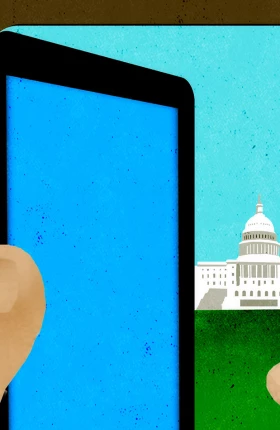The Australian government recently announced the establishment of its Digital Transformation Office (DTO) to advance the national e-government agenda. At the time, the prime minister and communications minister said that the DTO would operate “more like a start-up,” bringing together developers, researchers, and designers to put customer needs and user experience front and center. The idea of public services being as well designed and easy to use as Airbnb or goCatch sounds attractive, but just how feasible is it to create a digital start-up inside government?
Supporters point to the UK’s Government Digital Service (GDS), a unit established inside the UK Cabinet Office in 2011 to implement the government’s “digital by default” strategy. Denmark’s MindLab and Agency for Digitization have been around even longer and have helped make Denmark a world leader in digital government. Although the U.S. is behind in this space, it is quickly catching up. In 2014, it established the U.S. Digital Service, and this year it launched 18F, a new digital government-consulting unit inside the General Services Administration (GSA).
There are now more than a dozen similar digital government offices around the world. The Boston Consulting Group has looked at the initiatives in the UK, the U.S., and Denmark, as well as similar efforts by e-government leaders such as South Korea, Estonia, and Singapore; high-tech countries such as Finland, Norway, and Israel; and innovators such as the United Arab Emirates, New Zealand, and Malaysia. When we look at what is happening around the world, we can see clearly that governments need to consider five building blocks to create the right conditions for a successful “digital office.”
- Leadership. Without an obvious, visible, and vocal champion who “gets it” and is willing to sponsor, nurture, lead, fight for, and protect the agenda amid the competing priorities of government, progress on e-government will always be slow and incremental. The UK had a senior minister in Francis Maude leading the charge; New South Wales has Dominic Perrottet; and in Denmark, the prime minister led the agenda. The champion must come from the most senior levels of government and have digital as one of his or her top three priorities.
- Location. In most countries, the digital office is positioned close to the center of government in an agency such as finance, treasury, or cabinet. Some countries—for example, Singapore—locate their offices in the information and communications portfolios, while others opt for shared-service units such as the U.S. GSA and New Zealand’s Department of Internal Affairs. The best place for the office is wherever the strongest political champion happens to be.
- Talent. While the support and proximity of decision makers is important, let’s face it: the main benefit of setting up a digital office like the DTO is that you end up with a high-performing team that can attract talented people who are otherwise unlikely to join the public sector. In the private sector, internal start-up ventures are usually placed away from the core and as close as possible to the new skills and talent pools. Start-ups tend to cluster in incubators and innovation precincts because there are synergies in colocation. Digital talent wants to be near other talent because the groups inspire, support, and feed off each other. The beaches, alleys, valleys, and corridors of digital competition and collaboration breed a culture of disruptive innovation that is extremely difficult to manufacture inside a large, existing organization. One of the most influential factors in attracting good people is the leader. Most governments have brought in entrepreneurial leaders from outside. For example, Estonia’s government CIO, Taavi Kotka, was previously a software developer and Web entrepreneur, and Mike Bracken, executive director of digital in the UK Cabinet Office, has a background in digital disruption at the Guardian. The U.S. Digital Service is staffed with former executives from Google and Microsoft, and in Singapore, senior executives came from backgrounds in the IT sector. Their appointments are more than symbolic, as their leadership ultimately drives the internal culture.
- Culture. Certain characteristics of start-ups and attacker business models make them fundamentally different from conventional organizations. Sure, they wear different clothes, but it takes more than jeans and T-shirts to drive innovation. At their core, start-ups also have different ways of working, different techniques, a different language, and different skills. They don’t start by building a team and then work out what to do. Instead, they start with the user need and build a team around it. They use ethnographic research to discover customer needs. They do more than just define policies and standards; they design, build, and run. They commission and partner and collaborate. They use design thinking and agile development methods. They deploy alphas and betas and build minimum viable products rather than perfect solutions. They release early—and often. They are also more open to and collaborative about adopting the mantras of open standards, open source, and open government. The UK GDS runs a blog about its progress and activities and openly reports data on service costs and volumes. The GDS publicly tracks its progress against targets and publishes the source code on GitHub for other governments to use. This kind of openness, transparency, and sharing is unusual in government and utterly refreshing.
- Agenda. Governments that have made the most progress have set highly ambitious targets. Denmark’s goal is to get rid of all paper forms and letters. But these governments are also very strategic in their focus. The digital office cannot be a panacea for all the ills of government IT or an opportunistic dumping ground for stalled whole-of-government initiatives from the “too hard basket.” A common starting point is to improve access to government information. The GDS chose to address user frustrations associated with searching for government information by consolidating the myriad of government websites and redundant pages into a new gov.uk portal. The portal features a consistent look and feel, simpler language, and better design. Such initiatives are often followed by actions that expand the range of payments and transactional e-services available, redesigning them end to end in a low-touch or no-touch model.
Digital identity and assurance is another critical focus. Although there is a public perception that easier access to digital services is less secure and more susceptible to fraud, the reverse is true. Smarter analytics in the back end are better at picking up potential fraudulent activity using algorithms and behavioral triggers. Despite varying cultural attitudes toward privacy, there is clearly a role for government to facilitate the development of identity services and trust frameworks to grease the wheels of the digital economy. The digital team of New Zealand’s Ministry of Internal Affairs is developing an authentication service known as RealMe, which will be open to the private and public sector, and Sweden’s BankID model allows people to access government services using their existing banking credentials.
Last, but not least, most digital offices play a central role in leading government data initiatives. Making government data sets available to the public through centralized portals such as data.gov improves transparency and has the potential to create economic value. But the bigger opportunity is in using data and analytics platforms to optimize policy, program, and service design. For example, input and outcome data is used in areas such as education, health, and social services to determine the most effective interventions and areas of overservicing and underservicing.
Australia is hardly a laggard. In 2014, it ranked second in the world on the UN E-Government Development Index, and, notwithstanding the high-profile of the GDS, in many ways Australia has been more successful in moving services online and tackling the challenge of digital identity in the absence of a unique citizen identifier. Despite recent criticisms about the usability of the Department of Human Service’s Express Plus apps, it is hard to find examples of any other country with real-time transactional mobile apps for welfare payments. Similarly, the myGov service—for which the Human Services CIO, Gary Sterrenberg, recently won an award from iTnews—now provides secure online access, secure electronic correspondence, and tell-us-once services for more than 6 million people.
The DTO is an exciting development not because of what it is likely to achieve in the short term but because of what it might lead to in the long term. It has the potential to be the digital disruptor that recasts the future of government’s workings. Rather than just digitizing paper forms and letters, we should embrace the chance to build a new and truly digital government. Don’t get me wrong though. Fixing the front end of government is good. It’s better for citizens, and it’s good for taxpayers, but that kind of change is still largely at the periphery, not the core. The DTO could be the best opportunity we have had in a long time to reset and reimagine the business model of government for the digital age. But we must hurry. Technology continues to evolve and user expectations are constantly increasing. We need to accelerate the pace of digital transformation across the Australian economy, including the public sector: digital transformation is the key to unlocking productivity growth and increasing our global competitiveness.
This article was originally published by The Mandarin .






